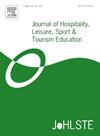Examining the effects of industry transition to robotics, artificial intelligence, and service automation on hospitality and tourism students’ critical outcomes: Quitting or quiet quitting?
IF 4.1
2区 教育学
Q1 EDUCATION & EDUCATIONAL RESEARCH
Journal of Hospitality Leisure Sport & Tourism Education
Pub Date : 2025-10-15
DOI:10.1016/j.jhlste.2025.100580
引用次数: 0
Abstract
Forecasts suggest that artificial intelligence (AI) and robotics may ultimately substitute for a significant portion of the jobs presently available in the hospitality sector, imposing serious sustainability challenges for academia and industry. On the other hand, this transition has generated notable concerns regarding robotics, artificial intelligence, and service automation (RAISA) among hospitality and tourism students. The objective of this study is to examine the consequences of this trend: depression caused by RAISA (DCR), quiet quitting (QQ), and intention to quit school (ITQS). To collect the necessary data for the research objectives, we administered an online survey to full-time students in institutions affiliated with the Hospitality and Culinary Arts Alliance. Using partial least squares structural equation modeling, we evaluated our model. The study's findings asserted that concerns over RAISA (COR) are positively related to hospitality and tourism students' DCR, QQ, and ITQS. Additionally, DCR partially mediated the link between COR and the outcome variables. Several contributions to the theory and fruitful implications for higher educational institutions were discussed in the following.
考察行业向机器人、人工智能和服务自动化转型对酒店和旅游专业学生关键成果的影响:退出还是安静退出?
预测表明,人工智能(AI)和机器人技术最终可能会取代目前酒店行业的很大一部分工作岗位,给学术界和工业界带来严重的可持续性挑战。另一方面,这种转变引起了酒店和旅游专业学生对机器人、人工智能和服务自动化(RAISA)的关注。本研究的目的是检验这一趋势的后果:由RAISA (DCR)、quiet quit (QQ)和intention to quit school (ITQS)引起的抑郁。为了收集研究目标所需的数据,我们对酒店与烹饪艺术联盟附属机构的全日制学生进行了在线调查。利用偏最小二乘结构方程模型对模型进行了评估。研究结果表明,对RAISA (COR)的关注与酒店和旅游专业学生的DCR、QQ和ITQS呈正相关。此外,DCR部分介导了COR与结果变量之间的联系。以下讨论了对该理论的一些贡献及其对高等教育机构的有益启示。
本文章由计算机程序翻译,如有差异,请以英文原文为准。
求助全文
约1分钟内获得全文
求助全文
来源期刊
CiteScore
8.10
自引率
10.80%
发文量
41
审稿时长
42 days
期刊介绍:
The Journal of Hospitality, Leisure, Sport and Tourism Education (JoHLSTE) is the leading international, peer-reviewed educational journal for this subject grouping. Its aims are to: a) Promote, enhance and disseminate research, good practice and innovation in all aspects of higher education in Hospitality, Leisure, Sport and Tourism and Events to its prime audience including teachers, researchers, employers, and policy makers. b) Encourage greater understanding, links and collaboration across its constituent fields. JoHLSTE is designed to have maximum impact through it being available on-line, fully archived and peer-reviewed. JoHLSTE is divided into seven sections: Editorial; Academic Papers; Practice Papers, Perspectives, Comments and Rejoinders, Research Notes and Reports and Education Resource Reviews.

 求助内容:
求助内容: 应助结果提醒方式:
应助结果提醒方式:


